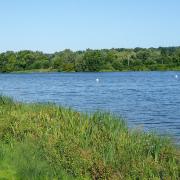The UK’s rarest amphibian is taking a huge leap forward thanks to scientists behind a pioneering breeding programme in Norfolk
The UK's rarest amphibian is taking a huge leap forward thanks to scientists behind a pioneering breeding programme in Norfolk. The pool frog (Pelophylax lessonae) became extinct in the UK in the 1990s but was reintroduced to a site in Norfolk between 2005 and 2008 by Amphibian and Reptile Conservation (ARC), a Dorset-based charity.
Now ARC has carried out a ground-breaking scheme to increase the animal's population. The 'head-starting' project uses a conservation technique for endangered species in which spawn, or young tadpoles, are raised in captivity and subsequently released into the wild. This allows a greater proportion to survive the riskiest part of their life-cycle away from predators or losses to other natural causes.
Spawn was collected from the original pool frog site in June 2019. The resulting tadpoles were reared in laboratory conditions over the summer and released into ponds at Thompson Common, the last-known refuge for pool frogs before their extinction and a site where previous experimental releases have shown promise.
Norfolk Wildlife Trust, which owns and manages Thompson Common, has created fantastic conditions for pool frogs by restoring ancient ponds. ARC hopes that the programme will succeed in building on the first reintroductions and increase the number of pool frogs living in the wild.
John Milton, head of Nature Reserves at Norfolk Wildlife Trust, said: "I'm especially excited to see pool frogs returning to Thompson Common as I was lucky to witness the spectacular vocal display of the males calling there on one balmy evening in June in the 1980s, before the population was sadly lost. It could become one of the UK's natural wonders once again."



























